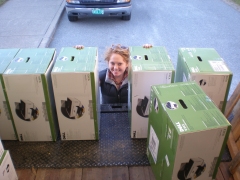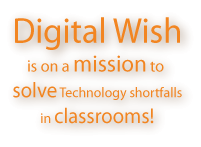1:1 Computing
Research – 1:1 Computing
Get the full story. Download the research 2012 study.
Participants:
- Over 2,000 Students
- Over 100 Teachers
- 30 Schools – Implemented 1:1 Computing
- 14 More school – Implemented Digital Citizenship Programs
Funders: The A. D. Henderson Foundation, Dell, Digital Wish, and local schools.
Pilot Program
Digital Wish implemented computers into four pilot schools in 2009-10. The impact:
 73% of students agree that schoolwork is more enjoyable when using a computer.
73% of students agree that schoolwork is more enjoyable when using a computer.- 85% of students report that they produce better work and pay closer attention to lessons when they use a computer.
- 95% of students report that it is important to have their own computer at school.
- Technology utilization doubled and even tripled across subjects for students and teachers with the largest utilization increases in English and research.
- Within in 3 months, comfort levels with computing increased in every classroom.
- 86% of students say they get work done more quickly when using a computer.
- 85% of students report that having technology in school is important to their future.
Implementation Phase
 Digital Wish generated $1.125 million dollars 2010-12 in stimulus funding, in partnership with the Vermont Council on Rural Development, Microsoft, Dell, and many others to implement 1:1 computing across 24 more schools. During the implementation phase 719 students and teachers were surveyed. The results are as follows:
Digital Wish generated $1.125 million dollars 2010-12 in stimulus funding, in partnership with the Vermont Council on Rural Development, Microsoft, Dell, and many others to implement 1:1 computing across 24 more schools. During the implementation phase 719 students and teachers were surveyed. The results are as follows:
- Workforce prep: 93% of students say having technology in school is important in preparing them for the future.
- Importance: 90% of students say that it is important to their education to have their own computer during the school year.
- Internet safety: Over 50% more teachers reported they are now very comfortable with internet research and safety, increasing from 40% to 63%.
- Skills: Teachers say that less than half as many students are considered beginners with computers. The consider approximately 1/3 more students to be advanced computer users
- College: Students who plan to go to college increased from 89.1% to 90.7%, a 1.6% increase.
- Collaboration: The number of teachers who are now comfortable with collaborating with peers, parents, and/or students using digital tools increased from 83% to 93%, a 10 percentage point increase.
The results of the 2010-12 implementation phase also included anecdotal gains as teachers reported that their students were more focused and willing to help others with difficult tasks. Visual learners who tended to be low achieving excelled at computers. Teachers also reported less computer breakage because students felt more a sense of pride when given their own computer.
Replication Phase
During the current replication phase in 2011-2014, Digital Wish collected data from an additional 30 teachers and 487 students. Digital Wish implemented 1:1 computing into 14 more schools. The results are as follows:
 Student Engagement: Student engagement increases 140% in word processing and writing, creating presentations, and video production.
Student Engagement: Student engagement increases 140% in word processing and writing, creating presentations, and video production.- Internet Safety: After the initiative, 93% of teachers say that they are comfortable with Internet safety, with 67% reporting that are VERY comfortable.
- Problem Solving: Students who say they can figure out just about anything on their own increased from 38% to 51%.
- Frequency: The number of students who say they have participated in ten or more technology projects that required them to solve a problem, gather information, or draw a conclusion, has nearly doubled, from 23% to 42%.
- Creativity: Teachers say that 46% of their students are experts or peer coaches in creating a new idea or an original project using technology, a value that almost quadrupled the pre-initiative’s mere 12%.
- Skill: teachers reported that after the program only 11% of their students are considered beginners with computers, a decrease from 30% pre-initiative levels. They consider approximately 50% of their students to be advanced/expert computer users, a value that has more than doubled since the 20% pre-deployment.
- Students becoming Tech “Experts”: The majority of students say they are computer experts. At the beginning; however, 50% of students had said that they didn’t know anything about Internet safety, solving problems related to technology and researching a topic on the Internet.
- Increased Intent to Attend College: the number of students who were NOT planning on attending college dropped from 6.8% to 4.3%.
Get the IT Curriculum That Produced These Gains
It’s available for just $995 per school site license for the complete 7-book / CD set. It includes videos, classroom-ready activities, lesson plans, printable worksheets, and a poster contest. Click here
Digital Citizenship Program
Digital Wish added a Digital Citizenship program in 2012-2013 across 14 more schools. The results were as follows:
- The number of students who know what being a good Digital Citizen means, tripled from only 26% to 96% after just 3 class periods.
- Students have become more confident with protecting their personal information on the Internet, with the number of students who consider themselves an expert almost doubling.
- 80% of students now consider themselves experts in knowing how to safely use the Internet, to treat other people with respect on the Internet, and to protect their personal information on the Internet after taking Digital Citizenship.
- Prior to Digital Citizenship, 34% of students had no idea what types of media they could now access online. 80% now consider themselves experts.
- While 69% of students now practice being a good Digital Citizen themselves, over 60% of students also encourage others to use the Internet safely as well.
Get the Curriculum that Produced these Gains
The Digital Citizenship curriculum is available for just $199 per school site license for the complete book / CD set. It includes videos, classroom-ready activities, lesson plans, printable worksheets, and a poster contest click here.
Return to main research area.

